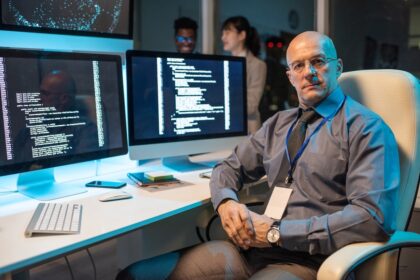Hinweis: Ich bin weder Initiator dieses Projekts noch dafür verantwortlich und repräsentiere auch nicht das BMZ. Ich versuche lediglich neutral und objektiv über dieses Thema zu informieren.
Das Digitalforum des Bundesministeriums für wirtschaftliche Zusammenarbeit und Entwicklung (BMZ) hat sich als zentrale Plattform etabliert, um den digitalen Wandel in der Entwicklungszusammenarbeit voranzutreiben. Es bietet Akteuren aus Politik, Wirtschaft, Zivilgesellschaft und Wissenschaft die Möglichkeit, sich auszutauschen, voneinander zu lernen und innovative Lösungen zu entwickeln.
In einer Welt, die zunehmend von digitalen Technologien geprägt ist, spielt das Digitalforum eine entscheidende Rolle, um globale Herausforderungen zu bewältigen und nachhaltige Entwicklung zu fördern.
Die Vision des Digitalforums
Das BMZ Digitalforum verfolgt eine klare Vision: den digitalen Wandel menschenzentriert, inklusiv und nachhaltig zu gestalten. Dabei geht es nicht nur darum, Technologien zu fördern, sondern vor allem um die Frage, wie diese effektiv eingesetzt werden können, um gesellschaftliche und wirtschaftliche Entwicklung zu unterstützen. Das Digitalforum versteht sich als ein Ort, an dem Wissen gebündelt, Ideen ausgetauscht und Kooperationen gefördert werden.
Ziele des Digitalforums
- Förderung des Dialogs: Das Digitalforum bringt Expertinnen und Experten aus verschiedenen Bereichen zusammen, um den Austausch zu Themen wie digitale Bildung, Gesundheit, Klima und Wirtschaft zu fördern.
- Stärkung digitaler Kompetenzen: Ziel ist es, digitale Fähigkeiten zu vermitteln, die nicht nur Fachkräfte, sondern auch Gemeinschaften stärken und sie auf die Anforderungen einer digitalen Welt vorbereiten.
- Schaffung innovativer Lösungen: Im Rahmen von Workshops, Hackathons und Diskussionen werden konkrete Projekte entwickelt, die auf die spezifischen Bedürfnisse der Partnerländer zugeschnitten sind.
- Politische Gestaltung: Das Forum bietet einen Raum, um politische Strategien für den digitalen Wandel zu diskutieren und die Weichen für eine zukunftsorientierte Entwicklungszusammenarbeit zu stellen.
Ein Ort des Lernens und der Zusammenarbeit
Das Digitalforum ist mehr als eine Konferenz oder ein Treffpunkt. Es ist ein Ort des gemeinsamen Lernens. Hier wird Wissen nicht nur weitergegeben, sondern auch gemeinschaftlich entwickelt. Teilnehmer können aus Erfahrungen anderer Länder und Projekte lernen, innovative Ansätze diskutieren und neue Partnerschaften eingehen.
1. Themenvielfalt
Das Forum deckt eine breite Palette an Themen ab, die für die digitale Transformation relevant sind:
- Digitale Bildung: Wie können E-Learning-Plattformen und digitale Tools Bildung weltweit zugänglicher machen?
- E-Health: Welche Rolle spielen digitale Lösungen im Gesundheitssektor, insbesondere in ländlichen Regionen?
- Künstliche Intelligenz und Datenanalyse: Wie können Daten genutzt werden, um Entwicklungsziele effektiver zu erreichen?
- Digitale Wirtschaft: Wie können Start-ups und kleine Unternehmen in Partnerländern durch digitale Tools unterstützt werden?
2. Interaktive Formate
Das Digitalforum setzt auf interaktive Formate wie Panel-Diskussionen, Workshops und Praxisbeispiele, um die Teilnehmenden aktiv einzubinden. Hackathons und Innovationswettbewerbe fördern die Entwicklung kreativer Lösungen in Echtzeit.
3. Erfolgsbeispiele teilen
Ein zentrales Element des Forums ist das Teilen von Erfolgsbeispielen. Projekte wie die digitale Lernplattform atingi, die von der GIZ entwickelt wurde, oder der Einsatz von Drohnentechnologie in der Gesundheitsversorgung werden vorgestellt, um andere Akteure zu inspirieren und mögliche Ansätze für die Skalierung zu diskutieren.
Erfolge und Herausforderungen
Das Digitalforum hat bereits beachtliche Erfolge erzielt. Es konnte zahlreiche Akteure zusammenbringen, digitale Projekte fördern und wichtige Impulse für die Entwicklungszusammenarbeit setzen. Dennoch gibt es Herausforderungen, die angegangen werden müssen:
- Digitale Kluft: In vielen Partnerländern besteht nach wie vor eine große Diskrepanz im Zugang zu digitalen Technologien. Das Forum setzt sich daher für Investitionen in Infrastruktur und digitale Bildung ein.
- Nachhaltigkeit: Digitale Projekte müssen langfristig wirksam sein und dürfen nicht nur kurzfristige Lösungen bieten. Hier spielen Themen wie Skalierbarkeit und lokale Eigenverantwortung eine wichtige Rolle.
- Datenschutz und Ethik: Der Umgang mit sensiblen Daten und die Einhaltung ethischer Standards sind wesentliche Herausforderungen, die im Forum thematisiert werden.
Zukunftsperspektiven
Das BMZ Digitalforum hat das Potenzial, eine noch größere Rolle bei der Gestaltung der digitalen Transformation zu spielen. Zukünftige Schwerpunkte könnten sein:
- Integration neuer Technologien: Wie können künstliche Intelligenz, Blockchain und das Internet der Dinge in der Entwicklungszusammenarbeit genutzt werden?
- Fokus auf lokale Innovationen: Stärkerer Einbezug lokaler Akteure und deren Perspektiven, um Lösungen besser an regionale Bedürfnisse anzupassen.
- Stärkung der internationalen Zusammenarbeit: Ausbau von Partnerschaften, um globale Synergien zu nutzen.
Fazit
Das Digitalforum des BMZ ist ein entscheidender Motor für die Förderung digitaler Innovationen in der Entwicklungszusammenarbeit. Durch den Austausch von Wissen, die Förderung von Kooperationen und die Entwicklung konkreter Lösungen leistet es einen wichtigen Beitrag zur Überwindung der digitalen Kluft und zur Schaffung einer inklusiven digitalen Zukunft. In einer Welt, die immer stärker von Technologie geprägt ist, zeigt das Forum, wie wichtig gemeinsames Lernen und Zusammenarbeit sind, um die Herausforderungen der digitalen Transformation zu meistern und nachhaltige Entwicklung zu fördern.
Info: Auf unserer Startseite finden Sie noch viele weitere Artikel.
- Smart Home und Smart Office: Was versteht man darunter? - 2. Januar 2026
- Zeiterfassung im Homeoffice: Darauf sollte man achten - 27. Dezember 2025
- Bewerbungsunterlagen: So werden Papierdokumente richtig digitalisiert - 23. Dezember 2025





